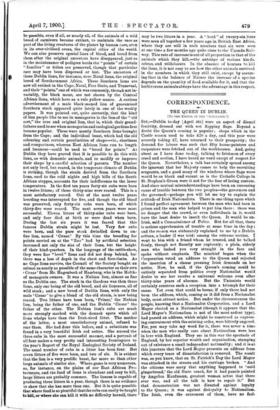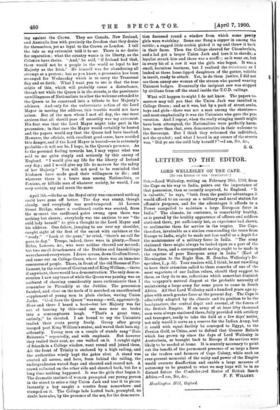CORRESPONDENCE.
THE QUEEN IN DUBLIN.
[To THE EDITOR OF THE "SPECTATOR:']
SIR,—Dablin to-day [April 4th] wore an aspect of dismal festivity, dressed out with wet flapping flags. Beyond a doubt the Queen's coming is popular ; shops which in the Castle season used to take £20 a day, and this year were scarcely taking £7, have returned to their prosperity ; the demand for labour was such that fifty house-painters and carpenters were fetched out of the workhouses. And, going about as I have done to-day, talking to Irishmen of every creed and section, I have heard no word except of respect for the Queen. Nevertheless, a talk has certainly spread among the ignorant that her Majesty comes to help the recruiting sergeants, and a good many of the windows where flags wave would be as blank and vacant as is the Catholic College in St. Stephen's Green were it not for the fear of losing custom. And since mutual misunderstandings have been an unceasing cause of trouble between the two peoples—the governors and the governed—perhaps you will let me try to explain the attitude of Irish Nationalists. There is one thing upon which I found perfect agreement between the man who had been in prison and the man who helped to put him there : there was no danger that the crowd, or even individuals in it, would have the least desire to insult the Queen. It would be un- Irish, said a Commissioner of Police. But for all that, there is serious apprehension of trouble at some time in the day ; and the reason was elaborately explained to me by a Dublin artisan, a leader (I was told) among the extreme section. I went to him with a friend whom he trusted, and he talked freely, though not fluently nor copiously; a plain, elderly man who looked you very straight in the face and spoke without emphasis. The mischief began when the Corporation voted an address to the Queen and rejected the insertion of a clause pressing Irish demands on her notice. Now, he said, if the Queen's coming could be entirely separated from politics every Nationalist would desire to see her receive a universal welcome even after thirty-nine years of absence. Bat the Unionists would certainly construe such a reception into a triumph for their cause. Yet even that could be borne, if only there had not been the address, which, coming as it did from a Nationalist body, must attract notice. But under the circumstances the people, knowing that a Nationalist Corporation, and a Lord Mayor elected as a Nationalist (though it appears that the Lord Mayor's Nationalism is not of the most ardent type), had passed an address, which might be construed as express- ing contentment with the existing order, were bitterly angered. For, you may take my word for it, there was never a time when the men who really care about Nationalism were less in love with England. They see in this war the spectacle of England, by her superior wealth and organisation, stamping out of existence a small independent nationality ; and it is at this juncture that the Lord Mayor presents an address from which every trace of dissatisfaction is removed. The result was, as you know, that on St. Patrick's Day the Lord Mayor was attacked in the streets and his carriage broken. " And the citizens were sorry that anything happened to 'could gingerbread,' the old State coach, for it had panels painted by Angelica Kaufmann, greatest woman artist that there ever was, and all the talk is how to repair it." But that demonstration was not directed against loyalty to the Queen ; it was against disloyalty to Nationalism. The Irish, even the extremest of them, have no feel-
ing against the Crown. They see Canada, New Zealand, and Australia free with precisely the freedom that they desire for themselves, yet as loyal to the Crown as London. I tell the tale as my extremist told it to me. There is no desire for separation ; what the country wants is its liberty, as the Colonies have theirs. "And," he said, " if Ireland had that, there would not be a people in the world so loyal to her Majesty as the Irish." He himself was for abandoning all attempt at a protest; but as you know, a procession has been arranged for Wednesday which is to carry the Transvaal flag and so forth. What I want you to see is that the true origin of this, which will probably cause a disturbance, though not while the Queen is in the streets, is the passionate unwillingness of Nationalists to allow the welcome extended to the Queen to be construed into a tribute to her Majesty's advisers. And only for the unfortunate action of the Lord Mayor in moving the address, this trouble would not have arisen. But of the men whom I met all day, the one most anxious that all should pass off smoothly was my extremist. His fear was that the Lord Mayor might take part in the procession ; in that case the Mayor would certainly be hooted and the papers would say that the Queen had been insulted. However, the officials, with excellent good sense, have avoided this danger, and if the Lord Mayor is hooted—as is extremely probable—it will not be, I hope, in the Queen's presence. As to the personal feeling towards her, I may repeat what was said to me quite simply and seriously by this enemy of England. "I would give my life for the liberty of Ireland any day ; and I would give my life to-morrow for the safety of her Majesty." You will not need to be reminded that Irishmen have made good their willingness to die ; and wherever there is a brave man among Nationalists, or Fenians, or hillside men of whatever society, be would, I am very certain, say and mean the same.
April 5th.—So far as the Royal entry was concerned nothing could have gone off better. The day was sunny, though cloudy, and everybody was good-tempered. At Leeson Street Bridge, where a cardboard castle was erected, from the moment the cardboard gates swung open there was nothing but shouts ; everybody was too anxious to see "the ould lady herself " to give a thought to the Lord Mayor and his address. One fellow, jumping to see over my shoulder, caught sight of the first of the escort with carbines at the " ready." " Look at the guns," he cried, " there's no call for guns to-day." Troops, indeed, there were in plenty,—Essex Rifles, Lancers, &c., who were neither cheered nor noticed; but two small detachments of the Dublins and Inniskillings were cheered everywhere. I drove across, down Grafton Street, and came out on College Green, where there was an immense concourse of people. There, in front of the old Houses of Par- liament, by the statues of Grattan and of King William,—there, if anywhere, there would be a demonstration. The only demon- stration I saw any trace of while the Queen was passing was an outburst of cheering considerably more enthusiastic than I remember in Piccadilly at the Jubilee. The procession finished, and close on the heels of it marched an unauthorised supplement of young men in plain clothes, waving Union Jacks. "God Save the Queen "was sung—well, aggressively. Here and there I heard a hoot—but her Majesty was far out of hearing by this—and one man near me broke into a contemptuous laugh. "That's a great tune, entirely," he shouted. I am bound to say the Unionists trailed their coats pretty freely. Group after group trooped past King William's statue, and waved their hats sig- nificantly. Young men on a couple of stands sang "Rule Britannia " repeatedly, and with emphasis. But however they trailed their coat, no one walked on it. I caught sight of friends in a College window, went round and joined them. All the front of Trinity is enclosed by a high railing, and the authorities wisely kept the gates shut. A stand was erected all across, and here, from behind the railing, the undergraduates waved flags and shouted and ceased not. A crowd collected on the other aide and shouted back, but for a long time nothing happened. It was the girls that began it. The dramatic instinct of woman prompted one young person in the street to seize a tiny Union Jack and tear it to pieces. Instantly a boy caught a rosette from somewhere and stamped on it. The College lads hooted back, prompted, no doubt here also, by the presence of the sex, for the demonstra tion focussed round a window from which some pretty girls were watching. Some one flung a copper in among the rabble; a ragged little urchin picked it up and threw it back in their faces. Then the College cheered for Chamberlain, and a lad got a larger Union Jack and tore it to shreds; a loyalist struck him and there was a scuffle; so it went on, but in every bit of a row it was the girls who began. It was a small, harmless business, but I realised the tricoteuses as I looked at these loose-lipped daughters of the gutter, voluble in insult, ready to attack. Yet, to do them justice, I did not see them annoy one woman of the stream who passed wearing Unionist badges. Eventually the incipient row was stopped by civilians from off the stand inside the T.C.D. railings.
What will happen to-night I do not know. The papers to. morrow may tell you that the Union Jack was insulted in College Green ; and so it was, but by a pack of street arabs, boys and girls—there was not a man among the shouters— and most emphatically it was the Unionists who gave the pro- vocation. And I repeat, when the really stinging insult might have been attempted, the Nationalists were perfectly harm. less : more than that, even demonstrative in their welcome to the Sovereign. But I think they welcomed the individual, not the symbol ; and what I heard in my corner of the streets was, "Did ye see the ould lady herself F "—I am, Sir, &c., S. G.







































 Previous page
Previous page